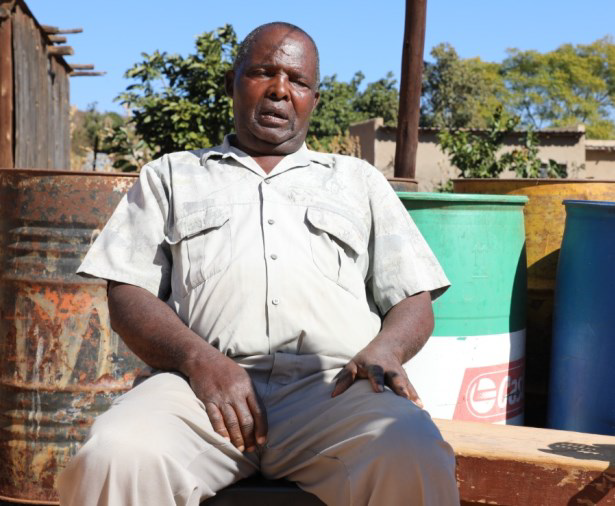TELA maize products are transforming livelihoods at household level in Matibidi village, Mpumalanga province in South Africa. Meet Mr Sam Maebela, a seasoned grain and vegetable farmer who realized exponential increase in his maize yield from the 1 drum (200kgs) he harvested from 1.5Ha in June 2017 to 17 drums (3400kgs) from the same piece of land in the same period in 2019; translating to a highly significant yield increase of 1600%.
Mr Maebela planted the insect resistant (Bt) TELA® maize hybrids varieties that are suitable for mid-altitude regions with relatively dry conditions such as Mpumalanga Province. The TELA Maize Project varieties (WE6206B, WE6207B, WE6208B, WE6209B and WE6210B) were approved for commercialization and released to farmers in South Africa at the end of 2016 after a decade of excellent breeding work under the Water Efficient Maize for Africa (WEMA) Project, now known as the TELA Maize project.
When the dreaded fall armyworm (FAW) attacked maize farms in Matibidi Village, many farmers abandoned their farms because of the heavy infestation. The Mpumalanga Department of Agriculture partnered with the Agricultural Research Council (ARC) and supplied TELA seed to farmers in Mpumalanga province including Mr Maebela.
“Before planting the TELA Maize, I could not harvest anything especially the maize”, this seed that I got was very helpful because it does not get attacked by insects. I harvested more than 17 drums and there is no one in my area that has harvested as many drums as me. Drought coupled with the FAW infestation meant most people did not harvest anything while I harvested. In fact, the community is now scared of me because they think my produce was actually via witchcraft. I do not prevent anyone from coming to see my produce, in fact I am not scared to be called a witch. A lot of people no longer come to this yard because they fear me. They say I practice witchcraft, but I am not worried. I just want them to see the maize, that’s all” said Mr Maebela in a recent monitoring visit made by the ARC.
The chief in Matabidi village in reaction to the witchcraft concerns raised by the community visited Mr Maebela’s farm.
Mr. Sam Maebela

Abandoned farms due to FAW infestation
“I let him inspect the maize and all I heard from him was “ahhh so much maize!! I am coming to get three or four drums”. I said to him he’s more than welcomed” (Maebela 2019).
The TELA maize varieties are creating real impact for farmers and communities.
“Now I see this maize, it is very beautiful maize, I really like it. I am certain that anyone that comes here will be very impressed. Do you see how many drums are here? Today I have so much yield and it is no longer just for me and my family. I would really appreciate having only four drums for me and my family and we will be ok for the rest of the year. It is too much, it is for me and anyone else from our community that is hungry” (Maebela 2019).
The long-term goal of the TELA Maize project is to make drought-tolerant and insect-pest protected maize available and affordable to smallholder farmers in Sub-Saharan Africa. Drought-tolerant and insect-pest protected maize varieties will help produce more reliable harvests and better grain quality due to reduced insect damage for smallholder farmers like Mr Sam Maebela. This means that they will be able to harvest enough to feed their families, have a surplus which they can sell to increase their incomes, and help strengthen local communities and countries.




















































































